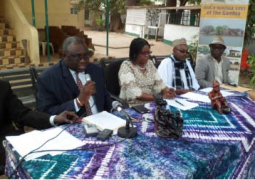As part of efforts to contribute to food security and poverty reduction among the rural Gambian population, particularly farmers, the National Environment Agency (NEA), in collaboration with the Participatory Integrated Watershed Management Project (PIWAMP) last Thursday held a daylong workshop on the Environmental and Social Management Plan (ESMP) of the PIWAMP, at the Baobab Holiday Resort in Bijilo.
ESMP is a plan of actions, stipulating what specific activities needed to be done to ensure that mitigation measures are duly implemented accordingly.
It aims, among others, to integrate environmental and social issues of the project with existing programmes, activities and other components of the project to promote overall improvement of development through effective coordination and implementation of the mitigating measures in a timely manner.
PIWAMP is an 8-year agricultural development project succeeding The Gambia's former Lowlands Agricultural Development Project (LADEP). Like the former project, PIWAMP aims to consolidate the gains registered by the LADEP.
Speaking at the opening ceremony, Ndey Sireng Bakurin, who deputised for the Director General of the NEA, said PIWAMP aims to contribute to food security and poverty reduction among rural Gambian population, mainly targeting smallholder farmers.
She stated that PIWAMP have a broader scope by attempting to address issues with land degradation in a bid to improve the productivity of agriculture, while at the same time protecting the environment.
For his part, the Permanent Secretary at the Ministry of Agriculture, Mr. Adourahaman Jobe said the validation seeks to support and sustain the tireless efforts of President Jammeh, who is also the Minister of Agriculture.
According to PS Jobe, PIWAMP seeks to contribute to food security and poverty reduction in rural Gambia. He added that over 75% of the population of the country depends on agriculture and that agriculture has now been recognised as a priority sector in the attainment of economic development of The Gambia. He added that the main purpose of the project is to increase land productivity and reduce soil erosion on a sustainable basis, as well as address watershed management and access to the area of production.


